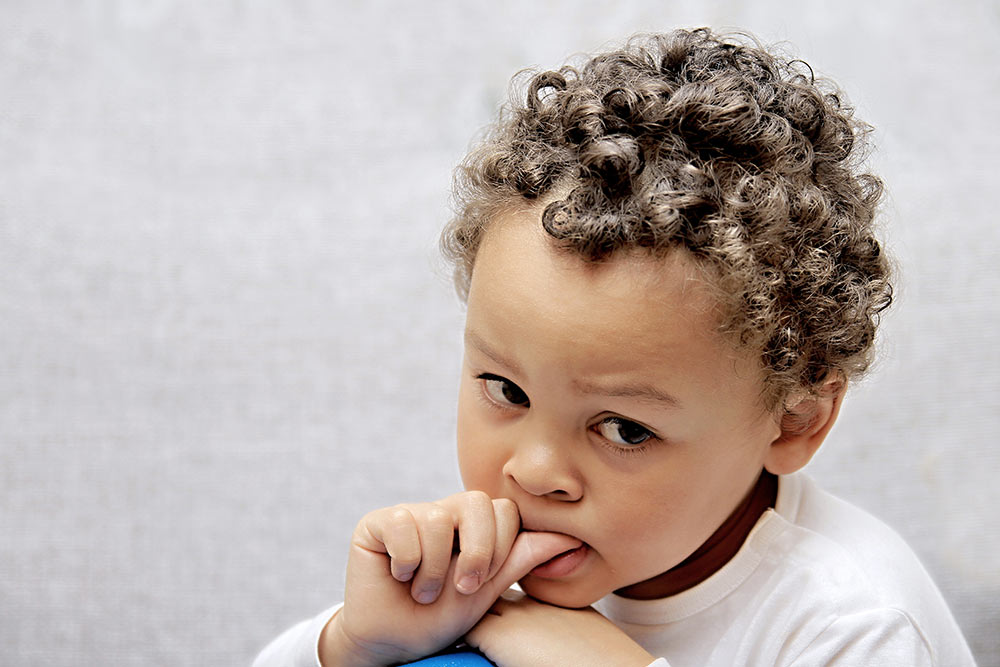Understanding Incessant Habits in Children

How and why habits develop early on, and expert tips on breaking them.
Medical Experts: Colleen Kraft, MD; Gabrina Dixon, MD; Tori Cordiano, PhD
We all have habits. Some may start in early childhood, while others develop later in life. Depending on the type of habit, those that progress into adulthood could have both beneficial and detrimental consequences, making habit cultivation an important part of parenting.
To start, it’s helpful to know how a child’s habits form, and how to stop the patterns if and when they’re harmful. After speaking with three experts, Pregnancy & Newborn breaks down everything you need to know.
Habit Formation
Some common childhood habits, or repetitive behaviors, include nail biting, nose picking, teeth grinding, thumb sucking, hair pulling, and lip licking and chewing. “For toddlers, it is generally thumb-sucking,” says Colleen Kraft, MD, a pediatrician at Children’s Hospital Los Angeles. “For older children, picking at the nose or skin and lip licking are more common.” Boys are also more likely to bite their nails while girls tend to twirl their hair, she adds.
Young children may develop incessant habits for various reasons, but they often stem from their natural curiosity—their love of exploring their environment and reliance on comforting sensations from infancy. “For some, it’s a way to self-soothe while for others it’s to relieve stress or combat boredom,” explains Gabrina Dixon, MD, hospitalist and affiliate faculty member of the Child Health Advocacy Institute at Children’s National Hospital in Washington, D.C.
Many of these habits become incessant, resulting in children not even being aware they’re doing them. “This explains why they often occur when children are occupied with something else, like watching a show, or when they are seeking comfort during separations and transitions, at bedtime, or when they’re upset,” says Tori Cordiano, PhD, licensed clinical psychologist in Beachwood, Ohio, specializing in the emotional, psychological, and behavioral development of children and adolescents. So while your preschooler’s constant nail-biting may seem impossible to miss, it’s likely they don’t even notice it.
Health Concerns
Typically, there aren’t major health concerns associated with childhood habits. In fact, as Dr. Cordiano explains, most habits are “developmentally appropriate toddler behaviors,” making them more frustrating for adults than children.
However, there are some habits where direct involvement may be needed to protect a child’s well-being. This includes habits that create safety issues, such as those that involve putting small objects in the mouth, or habits that persist into the school-age years that can result in social repercussions, like thumb-sucking. In some cases, if a child exhibits a “bad habit” that is so prominent it causes physical harm, it may be necessary to consult a medical professional.
Dr. Dixon explains, “It’s a big concern if the child is picking their nose or chewing their lips so much that they’re bleeding a lot, or if they’re biting their nails so much that they’re at risk of getting nail infections.” Depending on how long a child grinds their teeth or sucks their thumb, dental problems like enamel damage and shifting of the teeth can also arise.
You should also talk with your little one’s pediatrician if the habit seems to be associated with obsessive thoughts or stressful experiences since some habits are indicative of stress or anxiety, Dr. Kraft encourages. “Your child might pick at their skin because they are being teased at school or are experiencing anxiety,” she says, adding, “There is [also] a condition called trichotillomania, where children pull their hair to the point of hair loss.” Your pediatrician can offer guidance on how to help your child cope with possible stressors, or connect you with additional specialists if needed.
How to Break Bad Habits
Most habits will gradually subside on their own without much parental intervention. “Most children stop these ‘bad behaviors’ when they get older,” says Dr. Dixon. But there are still some steps you can take to nip them in the bud.
The first step is to figure out what is happening with your child around these habits. Dr. Kraft asks, “Do they happen when your child feels anxious? Do they seem to ‘zone out’ while thumb-sucking or hair twirling? Understanding the environment around when these habits occur is important in unlearning these habits.” Once you learn the root of the habit, you can try various methods to break it.
One such approach, Dr. Cordiano explains, is “pairing the situation with another comforting tool” when you notice your child engaging in the habit. For example, she suggests encouraging them to pet a stuffed animal at bedtime or rub a special bracelet during separations to help them expand their coping repertoire.
Or maybe you coax them into using “a special flavor for a lip moisturizer instead of lip licking, or a child-size tube of hand cream instead of nail-biting,” Dr. Kraft suggests.
Another technique she recommends using is positive reinforcement: consistently rewarding and praising positive behavior. “A child who is looking for a special item or action could be motivated to give up a habit to gain that reward,” Dr. Kraft says. If your child doesn’t bite their nails for a week, buy them a new color of nail polish. Further, silent approval means a lot to children, so even just winking at them when you see them applying lip moisturizer instead of licking their lips can have a positive effect, she suggests.
Another course of action Dr. Kraft proposes is letting your child know that you don’t like the behavior. “Something as simple as ‘when you pick your nose it doesn’t look nice, could you try to stop doing that?’ calmly and directly lets them know how you feel,” she says.
Lastly, Dr. Cordiano advises parents to help their children develop emotional regulation skills by “identifying and talking about feelings, modeling good coping, and maintaining regular daily habits to promote a sense of safety and consistency.” By doing this, children will be more equipped to handle difficult situations and strong emotions. However, ultimately what’s most important is that you never shame, lecture, or criticize your child for a habit. “Comments like ‘only babies suck their thumbs’ or ‘don’t you want to be a big boy?’ can create stress and anxiety for the child,” Dr. Cordiano says.
Overall, most habits are harmless. However, in the few cases that are detrimental to a child’s health and development, intervention should be taken. And although not necessary, if a child’s behavior is simply deemed annoying by you or your child’s peers, different courses of action can also be taken.
It’s important to remember the progress of breaking any habit takes time. So until your child can successfully squash the habit or it gradually disappears on its own, approach the situation as a learning experience.







